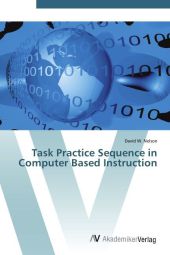 Neuerscheinungen 2012Stand: 2020-01-07 |
Schnellsuche
ISBN/Stichwort/Autor
|
Herderstraße 10
10625 Berlin
Tel.: 030 315 714 16
Fax 030 315 714 14
info@buchspektrum.de |

David W. Nelson
Task Practice Sequence in Computer Based Instruction
Aufl. 2012. 112 S.
Verlag/Jahr: AV AKADEMIKERVERLAG 2012
ISBN: 3-639-45287-9 (3639452879) / 3-8364-3612-4 (3836436124)
Neue ISBN: 978-3-639-45287-7 (9783639452877) / 978-3-8364-3612-0 (9783836436120)
Preis und Lieferzeit: Bitte klicken
Revision with unchanged content. Can the sequence of practice tasks affect the transfer of complex cognitive skills? Researchers have sifted through findings of instructional and cognitive science to find the most effective practice strategies by which to design practice tasks. Such strategies would enable learners to abstract principles, build schemata, and transfer their cognitive structures to improve performance of their skills in further learning or in the workplace. One such practice strategy, the random sequence of practice tasks high contextual interference has been applied in computer-based instruction. Although block sequence of practice practicing parts of skill in contiguous sets results in quicker and easier skill acquisition, random sequence of practice mixing skill parts in practice sessions results in superior transfer to unpracticed variants of a skill. This contextual interference effect has been found quite consistently in motor skills. How can this transfer paradox, as it has been called, be most effectively applied with complex cognitive skills? Curriculum planners, instructional designers, and researchers will find design and research suggestions that might help guide their work.
David W. Nelson, Ph.D., Instructional Systems at Florida State University. Instructional Systems Designer at the Learning Systems Institute, Florida State University.


